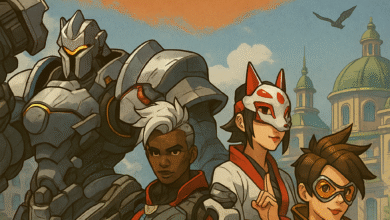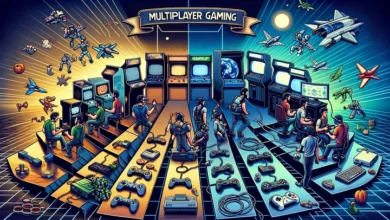How Online Multiplayer Games Are Changing the Future of Social Interaction

How Online Multiplayer Games Are Changing the Future of Social Interaction
Online multiplayer games have grown far beyond simple entertainment, evolving into a vibrant social space where players connect, collaborate, and compete. In 2025, online gaming is no longer just about completing missions or achieving high scores; it’s about fostering relationships, building communities, and reshaping the way we interact with one another. These games are not only altering the gaming industry but also playing a significant role in the future of social interaction.
From virtual hangouts to esports tournaments watched by millions, online multiplayer games are breaking down geographical boundaries and enabling individuals to connect in ways that were unimaginable just a few decades ago. In this article, we’ll explore how online multiplayer games are changing the way we interact socially and what the future holds for these evolving virtual spaces.
1. Breaking Geographical Barriers
One of the most significant ways that online multiplayer games have changed social interaction is by eliminating geographical barriers. Gone are the days when your circle of friends was limited to those living nearby. Today, gamers can connect with others from across the globe with just a few clicks.
For example, games like Fortnite, Call of Duty, and League of Legends bring together millions of players from all corners of the world. Players can chat, strategize, and collaborate with others who might be living on different continents. The result is a truly global gaming community where players form friendships and connections that transcend national and cultural boundaries.
Why It Matters:
- Players from diverse backgrounds can learn from each other and gain cultural insights.
- A truly global gaming community leads to diverse in-game strategies and perspectives.
- Social circles are no longer confined to local neighborhoods, enhancing global collaboration.
2. Virtual Social Spaces and Hangouts
Beyond competitive gameplay, many online multiplayer games have evolved into social spaces where players can meet, chat, and hang out in virtual worlds. Games like Roblox, Minecraft, and VRChat allow players to build and explore virtual environments together, often creating entire social spaces dedicated to chatting, dancing, or hosting virtual parties.
VRChat, for instance, offers a fully immersive experience where players can create their own avatars, attend virtual events, and socialize with others in real-time. These virtual spaces act as a form of escape and provide players with the opportunity to create new identities and interact socially in ways that aren’t possible in real life.
Why It Matters:
- Virtual spaces allow people to socialize in a more relaxed environment, without the constraints of geography.
- Enhanced social experiences through avatars and virtual events.
- Provides a safe space for people who may have difficulty socializing in person (e.g., introverts, people with disabilities).
3. The Rise of Online Communities and Fan Culture
Online multiplayer games have also led to the rise of massive gaming communities that extend well beyond the game itself. Popular games like League of Legends and World of Warcraft have not only fostered in-game relationships but have also given rise to fan-driven content, fan forums, and fan events.
Through dedicated online platforms like Reddit, Discord, and Twitch, players can engage in discussions, share experiences, and watch gameplay live, forming a sense of belonging and identity. These communities are built on a foundation of shared interests, with members bonding over a love for specific games, in-game lore, or even fan-made art and content.
Why It Matters:
- Strengthens the sense of belonging through shared passions.
- Online communities extend the life of games, turning them into cultural phenomena.
- Provides gamers with the opportunity to engage with influencers, developers, and other enthusiasts.
4. Esports as a Social Spectacle
The rise of esports has played a crucial role in transforming online multiplayer games into a form of entertainment on par with traditional sports. Esports tournaments like The International (Dota 2) and League of Legends World Championship are watched by millions of people around the world, making online gaming a spectator sport.
Esports has turned gaming into a spectator event, creating large fan bases who gather online (via platforms like Twitch and YouTube) to watch their favorite teams or players compete. For many fans, esports events are not just about the gameplay but about engaging with a community, watching live broadcasts, participating in fan activities, and sharing experiences with others.
Why It Matters:
- Esports communities enable players to share a passion for competitive gaming.
- Watching esports allows fans to connect socially, discussing strategies and moments in real-time.
- Professional gamers are now recognized as public figures, creating new forms of digital celebrity.
5. Enhanced Communication and Teamwork
One of the main attractions of online multiplayer games is the need for teamwork. Many popular online games, including Fortnite, Apex Legends, and Overwatch, require players to work together to achieve objectives. This fosters collaborative problem-solving, communication, and a deeper sense of teamwork among players.
Voice chat, team communication tools, and the ability to coordinate with other players have all become essential features in online multiplayer games. These tools not only enhance gameplay but also enable players to engage in meaningful conversations with teammates. The collaborative nature of these games encourages the formation of strong social bonds.
Why It Matters:
- Team-based gameplay strengthens communication and leadership skills.
- Players learn to coordinate and work together, improving their ability to solve problems in real-time.
- These experiences are transferable to real-world situations, fostering skills that benefit both social and professional environments.
6. Fostering Positive and Inclusive Social Spaces
Online multiplayer games are increasingly promoting positive social experiences, with many developers implementing tools that encourage inclusivity, kindness, and respect within communities. Many games now feature anti-toxic policies, in-game reporting systems, and safe spaces for marginalized communities.
Games like Overwatch and Minecraft have taken steps to create welcoming environments for people from all backgrounds and abilities. Additionally, many online games now feature accessibility options, such as colorblind modes, subtitles, and adaptive controllers, making it easier for players with disabilities to join the social experience.
Why It Matters:
- Games are becoming more inclusive, making them accessible to a wider range of players.
- Positive community-building tools help reduce toxicity in gaming environments.
- A more inclusive gaming culture can help combat online harassment and discrimination.
7. The Future: Virtual Reality (VR) and Augmented Reality (AR) in Social Interaction
Looking ahead, the future of online multiplayer games lies in the integration of VR and AR, which promises to transform how we interact socially in digital spaces. Virtual reality headsets like Oculus Rift and PlayStation VR are already allowing players to immerse themselves in 3D environments, making the gaming experience more interactive and lifelike.
With the rise of augmented reality, we might soon see multiplayer games that blend the real world with the virtual one, enabling players to interact with both physical and digital objects simultaneously. As these technologies improve, social interactions within games will feel even more natural and lifelike, further blurring the lines between the virtual and physical worlds.
Why It Matters:
- VR and AR will make online interactions feel even more immersive and lifelike.
- New technologies will open up innovative social experiences that combine the digital and physical worlds.
- As VR becomes more accessible, it will lead to new forms of social gaming communities.
Conclusion
Online multiplayer games are not just changing how we play; they are transforming how we connect with each other. From breaking down geographical barriers to creating immersive social spaces, these games have become a vital part of modern social interaction. As technology continues to advance, online games will only become more integrated into our social lives, offering new opportunities for collaboration, communication, and community building.
The future of online multiplayer games looks incredibly promising, with the potential for new social experiences that will redefine how we connect and interact in both virtual and real-world spaces. So, whether you’re bonding with friends in a battle royale or attending a virtual concert in Roblox, online gaming is undeniably changing the way we socialize — and it’s only just the beginning.




